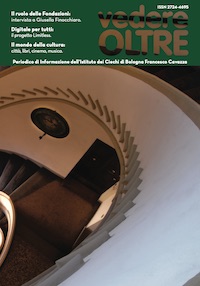"I've missed communicating with the outside world and friends who cannot visit me right now." Gabriella, one of the first participants in the Limitless Project, tells us the main motivation that led her to approach the visual rehabilitation project related to new technologies.
Limitless, is the name of the project launched in January by the Institute for the Blind Francesco Cavazza, thanks to the valuable support of the Fondazione del Monte di Bologna e Ravenna and aimed at people over 65 who are blind or visually impaired.
.jpg)
During the months of lockdown, even the most mundane activities, such as shopping, have been difficult for older people who are less accustomed to technology, and even more difficult for those who, because of vision problems, are unable to use the online resources that have proved so useful during this period.
“Gabriella's words are more or less the same that we hear repeated by all the users who call us these days." Michele Landolfo, a computer analysist specialized in blindness and a project team member, tells us about students' difficulties and expectations as they begin to familiarize themselves with digital technologies and home automation.
"Often we begin with a lack of basic knowledge about computers so the first impact with the tablet can be a bit of a shock," continues Landolfo, "the glass surface without physical references, the touch on the screen which has to be delicate, the use of the fingertip to interface with the elements. It usually only takes a few minutes, however, to get over the first impact."
Leveraging resources on tablets and smartphones, we work on a variety of senses such as speaking for interacting with voice assistants, listening for reading items, books, and text, and touching for interacting with the display in order to address the barriers caused by vision loss.
.jpg)
This first phase will target 50 blind or visually impaired people over the age of 65, who will learn to read books and newspapers in a facilitated manner, play games, do their home banking and much more, thanks to the features introduced lesson by lesson.
After an initial in-person phase which includes an assessment of residual visual skills and the degree of personal autonomy, remote teleconsultation sessions will follow through the same software used to chat and video-call friends and family.
Visual impairment in old age affects a large number of people. "The pathologies causing blindness and low vision increase considerably after 50 years of age," explains Dr. Francesca Quagliano, an ophthalmologist of the Ophthalmology Unit of the Ospedale Maggiore AUSL Bologna, "this is due to the increase in the average life span and, to higher rates of degenerative diseases such as age-related macular degeneration and other diseases such as glaucoma, which affects 2.5% of the population over 40 and 10% over 70, or diabetic retinopathy, the most serious complication of diabetes, a disease that affects 5% of the general population rising to 16.5 after 65 years."
"The leading cause of low vision in industrialized countries is age-related macular degeneration," begins Dr. Antonio Ciardella, ophthalmologist and Director of the Ophthalmology Unit of the S. Orsola Malpighi Hospital in Bologna, in describing the scope and social importance of this project. "This disease manifests itself with age, usually appearing after the age of 50 and tending to increase in frequency, especially around the age of 70-80. There are an estimated 170 million people worldwide who are affected, a number expected to double in the next 20-30 years as the average age of the population increases." The forms of maculopathy generally maintain intact the peripheral vision which can be used for orientation and mobility and to read large characters on the monitor, without any risk to the eyes. “The structural damage on the retina is independent of activities such as reading or the use of devices such as tablets, smartphones and video terminals," continues Ciardella, "the only recommendation we make to our patients is to wear sunglasses when they are exposed to intense sunlight and to have a balanced diet that limits prepackaged foods and red meat and focuses instead on vegetables, fruits, white meat and fish."
Participating in the Limitless Project is simple:
Simply contact the Istituto Cavazza's Technology Help Centre by phone at 051 332090 or by email at ausilioteca@cavazza.it. The service is free.





.png)